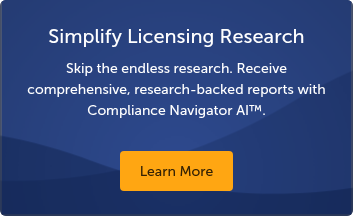
Pesticide Technician License
Interested in starting or expanding your pesticide business? Learn how to obtain and maintain a pesticide technician license in all 50 states.
Federal law requires any person who applies or supervises restricted-use pesticides (RUP) to be certified under Environmental Protection Agency (EPA) regulations and state, territorial and tribal laws. Pesticide technicians must know how to apply RUPs properly and effectively. You must be certified in each state and where you make RUP applications. It’s important to check to see how the state requirements compare to the federal government requirements.
Federal Regulations
EPA regulations establish minimum standards of competency for pesticide technicians that apply or supervise the use of RUPs. Information about federal certification standards for pesticide technicians can be found on the FDA website.
The EPA has oversight of state, territory, tribal, and federal agency certification programs to ensure they meet specific standards. The EPA also helps mitigate the risks of pesticides, including RUPs, through pesticide registration efforts and ongoing registration review programs.
Business Registration and Licensing
The process of registering your business will depend on your state's requirements. In general, you will go through the following steps:
- Research your state's business registration and licensing requirements.
- Choose your business name and entity structure.
- Obtain a federal tax identification number from the Internal Revenue Service and register with the Secretary of State.
- Obtain necessary types of insurance, including general liability, commercial auto, and workers' compensation.
- Research license and registration renewal requirements to keep your business compliant.
Most states have a Pesticide Safety Education Program. Contact the Pesticide Safety Education Program in your state or territory for information on training and study materials. Once you pass the required exams and receive a pesticide certification, you can proceed with obtaining your business license. Note that not all states require licensure once a certificate is received. States that do require licensure may have different requirements for private, commercial, and public technicians.
To apply for a pesticide business license, you will need to gather all relevant documentation, including financial statements, proof of a commercial activity license, and a business plan, at a minimum. You will also need to appoint a registered agent to receive notices of lawsuits and other legal or government notices.
Meeting the pesticide technician license requirements is not always an easy process. Fortunately, the Harbor Compliance License Manager helps firms maintain their licenses by automating repetitive tasks such as tracking renewals. Through License Manager, you can also access Compliance Core™ – our extensive licensing database – to research the requirements in the states where you operate.
Insurance
In addition to obtaining the proper certifications and licenses to run your business, you also need to have a risk management plan in the form of insurance. The most common insurance policies pesticide companies adopt include the following:
- Automobile liability insurance insures property damage and bodily injury in the event of an accident with a work vehicle.
- General liability insurance covers bodily injury, care, custody, control coverage, errors, and omissions endorsement if a client, customer, or third party is injured.
- Workers' compensation insurance applies when you have employees, as it covers bodily injury within the scope and course of employment.
What is best for your business depends on your location and your services. Contact an insurance specialist to learn about your options.
Maintaining and Renewing Licensure as a Pesticide Technician
There are several steps businesses need to take to ensure they continue to comply with state laws after receiving a pesticide technician license. License renewal often happens on an annual or biennial basis.
Keeping on track with your business' license renewals can be complicated, especially as a growing company. At Harbor Compliance, we offer a range of software and managed services that assist firms with annual licensing and other business lifecycle compliance needs, such as annual reporting and registered agent services. We help clients accurately track due dates and filing requirements so that your business will continue to be compliant with state and local requirements. Plus, you will have the time to continue working and expanding your clientele.
If you are looking for software to manage the licensing tasks or to outsource your license maintenance and business compliance duties, Harbor Compliance can help. We are available to review your business status, ensure you are in good standing in the states where you operate, and explain the steps to ensure you remain compliant with state and federal regulations. Contact our licensing specialist today to learn more.
Explore Licensing by State
Click on a link below to view licensing information in your state.
Associated General Contractors of America
Professional association providing advocacy and organization for construction firms and workers.
National Association of Home Builders
National association for the promotion of the housing industry.
National Association of State Contractors Licensing Agencies
National organization that represents and promotes the interests of state level contractor licensing agencies.



